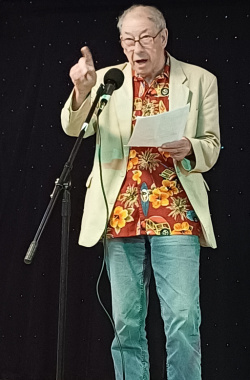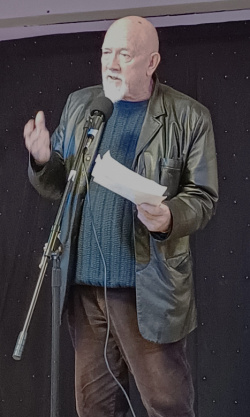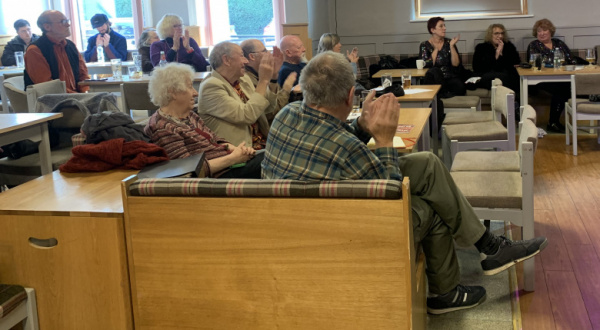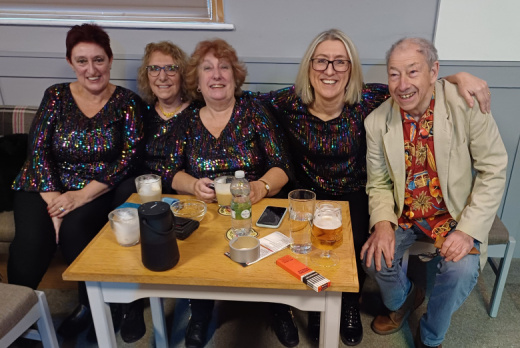Twenty years ago, did I imagine that Write Out Loud would still be here in 2025? No …!

Welcome to 2025 – and to Write Out Loud’s 20th anniversary as a poetry website! We have a number of things planned to commemorate this year, including a big new competition. We’ll be launching that - with full details of how to enter – in February. Meanwhile we thought it was time we caught up with the man who was there at the start of it all, and is still very much at the Write Out Loud helm – Julian Jordon.
For those that don’t know the story, Julian, can you tell us how Write Out Loud began?
I was living in Bolton and my pal, Dave Morgan, phoned me. "Julian, there's a chap running a poetry night in the Man and Scythe tonight. Bring your poems."
“But Dave, I don't write poetry.”
“ 'Course you do. Everybody writes poetry.”
So I took my poems, came out as a writer of poetry, nervously reading my naive words to a welcoming group of people. We were five or six only, but that didn't matter. Everyone read something; everyone got listened to; everyone got applause.
It was a challenge. The pub was what you might call 'lively' - football on a large screen, poetry in a side room just off the raucous main bar, and a wicker screen where the door had once been. And I was changed by the experience.
Organised and led by local busker John Jelly, it was the atmosphere he created that made the difference: giving everyone time and space to read when they were ready without being pressured to do so. Something with which Dave and I were familiar from our days working together in community education.
There were few people there though, which seemed a shame as we were sure others would benefit from and enjoy it. Apart from the excitement of having stuff I'd written actually listened to and applauded, I soon realised how poor and naive my writing was, the upshot being that I started writing properly, and for several years I would write every morning without fail, often neglecting my paid freelance writing work to do so.

I am not sure how aware we were of a poetry scene at first. I think we thought we'd invented it; at least, for a little while. But, frustrated at having only our local, monthly event we wanted to find other places to read and audiences to listen. That, and only having a few poems to my name at that time, and not wanting to overburden our local audience, we ventured further afield. Manchester was 20 minutes by train, and had more poetry events on and organisations creating opportunities.
Although, it was perhaps upon discovering the longest running (circa 25 years) night in the region - Liverpool's wonderfully named Dead Good Poets Society - that we realised we needed to take our operation up a notch. DGPS had a large 'audience' - mostly contributors, or readers of their own writing. And what an eclectic mix they were: established poets, university teachers, students, bus drivers, community activists, shopworkers, and more. They read their sonnets, haiku, rhyming couplets; about love and loss, the government's latest scandal or the dog-fouling on their council estate. That was where we realised that this open-mic/read-around poetry was more than just a friendly exchange of our scribblings, it was a way for individuals to be able to express themselves, to find a voice and an audience to hear it.
Dave and I, having worked together in Liverpool a few years earlier, in adult and community education, found it a bit like coming home. We more or less modelled ourselves on what we saw at the DGPS, and perhaps the Wicked Words events in Chapeltown in Leeds too, run for such a long time by Brendan McPartlan.

Exciting. Challenging. Dave [pictured right] and I set up a monthly read-around at a pub near Bolton station: the Sweet Green Tavern. we were in a tiny alcove off the bar and advertised it mostly via word-of-mouth. We were also travelling to other events in Manchester and letting people there know about our own. Being beside the train and bus stations made our venue accessible for enough people to make the event viable, though if a dozen turned up we were full.
One month we sent a press release to the local paper and were so swamped with people we took over the pub's main room. The paper had misleadingly described it as an audition, but it did bring several would-be poets out of the woodwork, many of whom stayed with us when we moved to bigger premises, a well-known pub called the Howcroft. It had a back room that would fit around 50 people in its comfy surroundings, and it became our home, at least for a few years. And we regularly filled that back room.
Meanwhile, my son Michael, who was working as a software engineer, casually suggested we needed a website, and conversation started: What for? Who might use it? What were we letting ourselves in for? He was soon joined by his boyhood pal, Paul Emberson, as they worked on developing and redeveloping the site. We set it up with some items that we didn't know would work but just thought we'd see what our users - if we managed to get any - decided to do with it.
We created a news section for articles about poetry, discussions pages where folks could post a question (favourite line of poetry? worst poem ...?) for discussion, the gig guide and what we called poetry blogs. We thought they would become blogs as we know them today – and sometimes they are, but our users generally wanted to share their poems with like-minded people just as they do in open-mic, read-around or spoken word events. It turns out that many of our hundreds of poetry blog users never actually go to open-mic events, preferring – for whatever reason - the anonymity of the poetry blogs, which have actually turned into an astonishing online poetry community, with much discussion between its worldwide membership.
How do you think the website – and indeed, the poetry scene - have changed over the years?
To start with the website, we have found that the once-busy discussion pages declined with the onset of alternatives, particularly Facebook. We also found that some people were using Facebook as a means to advertise their poetry events rather than using what had become our national poetry event listings, in spite of the fact that our website was often praised for its clever and easy usage, being able to list recurring events automatically. And the fact that it was unique had encouraged many people to take the view that 'if you are not on the Write Out Loud gig guide, you are missing out.' In spite of Facebook, the gig guide grew to the point where people were complaining to us that there was no poetry open-mic in their area and why didn't we set one up for them. We said: you set it up and we'll support you, which we did for many, firstly in the north-west and then beyond. Currently there are in-person Write Out Loud nights in Bolton, Wigan, Stockport, Sale, and Woking, and in Northumberland on Zoom.
Until 2019, the numbers of users of the website was growing significantly year on year. I was travelling fairly regularly to Washington DC to visit family and of course visiting open-mic nights, and they started listing on the gig guide too.
And then, of course, came Covid, and lockdown. The night it was announced, we had to clear all the listed gigs off our home page. For the first time in 14 years, we had to switch off the guide. There were no gigs. As we all know, that's when Zoom popped into our consciousness – Write Out Loud Sale was one of the first in the country, if not the first, to spearhead Zoom - and we began listing those events on the guide, as well as reporting teething problems with them, how top performance poets were coping, and generally keeping our online audience in touch.
To give you an idea of numbers - in May 2005, the month we launched the website, we had 201 visitors (unique individuals), who between them made 341 visits to the site.
By 2019, we had 262,370 unique individuals making between them 598,902 visits - and this month, thanks to our team's work on the advent calendar that has been such fun for everyone, we have had 287,000 unique individuals making 870,000 visits, and that is only up to the 21st December!
One thing I can say is that the wider poetry scene has grown in size and reputation. This ‘upstart open-mic nonsense’ is now regarded much more favourably by many ‘establishment’ organisations such as the Poetry Society. The Forward Prize even has a performance poetry category these days! Yet in the early days, we got complaints that Write Out Loud was dumbing down poetry, and somehow linking that to figures about fewer poetry books being bought.
I would answer with Adrian Mitchell's adage: “Most people ignore most poetry, because most poetry ignores most people.” That has become less true as the whole poetry scene has not just expanded, it has changed in character. Instead of seeing ‘literary’ or ‘page’ poetry and spoken word/open-mic poetry as opposites, we should recognise that it is a continuum.
How many famous poets would genuinely have written top-quality poems when starting out? We all start somewhere, and many of the organisations that have grown up supporting writers and diversifying the mix of those engaging with poetry, ourselves included, have helped people to move up the continuum from beginner to an improving poet and beyond. Of course, not everyone actually wants to do more than share their work with like-minded others, whether online or in local groups. It is a social activity as much as a means of expressing yourself in your unique way, and sharing your views with others.
One of the great advantages of the local poetry sharing groups was the fact that it allowed people whose grasp of grammar or spelling was not sufficient to give them confidence to publish (in books or magazines) something they'd written. So long as you could read your poem well enough to be understood and enjoyed by others, who needs spelling?
What I know of the wider 'scene' suggests a much wider acceptance of all this, and a recognition of what we might call 'people power'. And our website has played a significant role in promoting the work of people who once upon a time wouldn't be accepted as someone who writes or performs poetry.

Our aim is to help people improve their lives through the power of poetry, no matter their background or circumstances.
Lots of other organisations also help, in myriad ways, and we see our role as acting as a hub of information, inspiration and encouragement, both to developing poets, and to poetry organisations.
We haven't always managed to fulfil our potential, to date, in spite of the incredible feedback we get from both individuals and organisations. Neil Astley, director of Boodaxe Books, perhaps the UK's most successful poetry publisher, described our website as a lifesaver during the pandemic; performance poet Kate Fox considers us “the nexus of the poetry ecosystem”.
Our website aims to be a treasure chest of information, contacts, links and opportunities for all our users and clients, whether individuals or organisations engaged in poetry. A central information hub, and an online community of people developing themselves as writers of poetry.
We aim to turn the website into an even bigger, better poetry nexus by expanding the things we already do, and adding more information. For example, as well as gigs, we want to list all available educational opportunities for budding and developing poets, as well as competitions, magazines, publishers, agents, openings for poems, etc. A poet's compendium, perhaps.
We would like to provide more articles both for budding and developing poets - how to approach gig owners or publishers, how to read, project, and edit your work, and so forth. Perhaps funding opportunities, and articles with advice from those who have successfully won funding.
As for poetry organisers and providers, we aim not to compete with them but to facilitate their work and provide a focus for their activities, informing individual writers/poets/performers of what is going on in poetry: news articles, reviews, listings, workshops, our online poetry community (poetry blogs). Our online-mediated poetry competitions are partly for our own funding, partly as a service to our community.
Open-floor/live poetry was where we started, but that is part of a continuum that includes live, published, ‘amateur’, ‘professional’ and ‘academic’ poetry.
Open-floor poetry enables people to share their writing with others, thus finding their voice and being able to express themselves and participate in a shared experience with like-minded others. We want people who don’t currently get the chance, to be able to share their writing with like-minded others anywhere in the world.
But we also want them to then have opportunities to learn, develop their skills and their enjoyment of their own and others’ poetry, joining with others in shared experiences, across cultural, linguistic, geographical or social divides.
We further believe that our job is to encourage interaction between people and between organisations, encouraging growth and development of organisations, too.
We are firmly internationalist in outlook and believe that the kind of interaction that takes place between people in live poetry events – particularly open-floor events – helps break down social barriers, and can help break down other barriers, cross-cultural, gender, political, linguistic and others.
In the early years, could you imagine that Write Out Loud would still be here in 2025?
No.
A colleague from our first committee was opposed to the idea of having a website, suggesting it would last no longer than six months. That was in May 2005. That colleague has gone on to run an incredibly successful local arts organisation. And we are still friends.
We have had a difficult few years since Covid, but our latest stats show that we are back and thriving, ready to take Write Out Loud into its next 20 years of helping people improve their lives through the power of poetry.

For many years you compered the annual poetry jam at Marsden jazz festival, before moving away from the village. How did it feel to come back this year, and find it still going strong?
I compered the poetry jam for 10 years - and coming back this year was very satisfying.
I was delighted when Isobel Clarke took it on. Not an easy thing for anyone to do: the jazz festival has lost its Arts Council funding and could have disappeared, but they managed to keep it going; and our longstanding venue, the Railway Inn (Simon Armitage's local when he lived in Marsden, he told us) had to close at the last minute.
But the indefatigable Isobel organised everything and ran it superbly.
What are your hopes for the future of Write Out Loud? Do you have any regrets?
Regrets? I have had a few, but then again, too many to mention.
I hope:
we can keep our present team of wonderful volunteers, and manage to recruit some more like them;
we can obtain some decent funding soon to allow us to put it all on a sound footing;
I can shuffle off the stage confident in the knowledge that it will still be here in another 20 years, still helping people to improve their lives through poetry;
we continue to receive quotes from our users and friends of Write Out Loud, like these:
“I don't like poetry, but that was fantastic” (feedback from the 2024 Marsden poetry jam)
“Good luck to this great poetic community!”
“Write Out Loud is an amazing resource for all things poetry! Thanks for the brilliant work that you do!” – performance poet Rose Condo
“Some of my first nights were with Write Out Loud … what Write Out Loud does, and [other] arts organisations, it isn’t only life-changing, life-enhancing, it’s life-saving sometimes” – spoken word and performance poet Tony Walsh
Neil Astley, widely respected editor and publisher of Bloodaxe Books: “Write Out Loud is a great resource for everything going on in poetry from the grassroots upwards and outwards. The more people have used it, written for it, and fed it their news and poems, the more it has grown into an even lively and more accessible network which has become an online lifeline for many during the pandemic.”
Performance poet Luke Wright: “These days I’m asked for my advice, how do you get started in this game? One of the first things I always say to people is check out Write Out Loud. You’ve got a gig listing, you’ve got stacks of articles, interviews, features, news stories, you’ve got a place to share your work, and a genuine online community of people who practise the art of spoken word. It’s not only a vital resource, I feel it legitimises us in a way, it makes us seem proper. We’re very lucky to have it.”
Performance poet Kate Fox: “Write Out Loud has long been an invaluable resource for the live poetry scene. It recognises how the world of poetry is an ecosystem with professional events and poets, amateur open mics and poets all entwined and interdependent. With its competent journalistic approach, wide regional coverage and responsive listings, Write Out Loud has long been a notable part of that ecosystem (and personally, often the first place I’ve approached with stories or things I’ve wanted to publicise) I’m excited and chuffed that they’re being ambitious in these changing times and happy to support their plans. As the poetry world continues to be an interdependent ecosystem, then having an organisation passionate about linking disparate dots up is even more vital.”
Stand-up performer and poet Elvis McGonagall: "Write Loud is a well-established and vital resource not just for the UK poetry community but further afield around the globe. For nearly 20 years it’s been providing news, reviews, discussions and support as well as being the UK’s no.1 poetry gig guide … It can sometimes feel like a lonely business being a poet. Write Out Loud brings poets together and makes you feel part of something bigger.”

Julian Jordon with Isobel Clarke, second from right, and her All4One singing sisters, from left, Yolande Clough, Eleanor Nelson and Catherine Greenlees at the Write Out Loud poetry jam at Marsden Jazz Festival in October 2024
Background: 'Don't go flashing those metaphors ...!






Dave Morgan
Tue 14th Jan 2025 10:39
Blow for blow. Thanks Julian.. Perhaps one thing WoL did in those days was challenge some preconceptions of what was considered acceptable from a range of perspectives, academic, performance, comedic. It was, and remains, inclusive and respectful of the need to write it down and get it out. I think we have always understood the personal or therapeutic value of that process.
You modestly didn't mention one of WoL's early triumphs, its visits to arts events in Bordeaux. Seared on the memory, Bordeaux still probably scarred. Somewhere on my WoL blog is an acount of one of them.Impossible without your contacts and love of all things French.